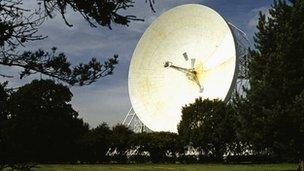Astronomer Sir Bernard Lovell dies
- Published
A look at Sir Bernard Lovell's achievements
Pioneering astronomer and physicist Sir Bernard Lovell has died aged 98.
Sir Bernard, who was born near Bristol and studied in the city, was the founder of University of Manchester's Jodrell Bank Observatory.
Jodrell Bank and the surrounding Cheshire countryside is dominated by the Lovell Radio Telescope, which was conceived by Sir Bernard.
Professor Brian Cox, who knew Sir Bernard, said he was "an inquisitive scientist all the way".
A book of condolence has been opened at the observatory's Discovery Centre.
Sir Bernard was born in Oldland Common, Gloucestershire, in 1913 and studied at the University of Bristol before joining the University of Manchester's Department of Physics in 1936.
'Visionary leader'
During World War II he led a team developing radar technology, for which he was later awarded an OBE.
Following the war, he returned to the university and set about planning the observatory.
His iconic 76m (249ft) telescope was completed in 1957. Within days of it becoming operational, it tracked the rocket that carried Sputnik 1 into orbit.

The Lovell Telescope was completed in 1957 and is the third largest steerable telescope in the world
The structure remains the third largest steerable telescope in the world and plays a key role in global research on pulsating stars, testing extreme physics theories including Einstein's general theory of relativity.
The telescope and his other contributions to radio astronomy led to him being knighted in 1961.
Lord Martin Rees, Astronomer Royal, said: "Bernard Lovell ranks as one of the great visionary leaders of science.
"He had the boldness and self-confidence to conceive a giant radio telescope, and the persistence to see it through to completion, despite the risk of bankruptcy.
"What is even more remarkable is that, more than 50 years later, this instrument (after several upgrades) is still doing 'frontier' science.
"I recall the celebrations of the telescope's 50th anniversary in 2007. Lovell, though nearly blind, played a full part in the festivities and made a superb speech.
"He rightly took great pride in this lasting monument."
A spokesman for the university said Sir Bernard was "warm and generous".
He said the astronomer had "retained a keen interest in the development of science at Jodrell Bank and beyond," and added: "Indeed he continued to come in to work at the Observatory until quite recently when ill health intervened."
'A pioneer'
Sir Bernard was also an accomplished musician, a keen cricketer and an internationally-renowned arboriculturalist who created an arboretum at Jodrell Bank.
He is survived by four of his five children, 14 grandchildren and 14 great-grandchildren.
Professor Cox, who met Sir Bernard after joining the University of Manchester in the 1990s, said: "I remember once I went to his house and immediately he said 'ah Cox, tell me about this muon' [a sub-atomic particle].
"He knew that I was doing particle physics and thought back to the last time he had thought about such things - he'd been thinking about astronomy for decades - and that's what he wanted to talk about.
"That was him - all his life, he was a scientist.
"He was a pioneer of radio astronomy and almost invented the subject.
"He built the leading telescope and that radio study of the sky has contributed a vast amount to our understanding of the universe."
- Published7 August 2012